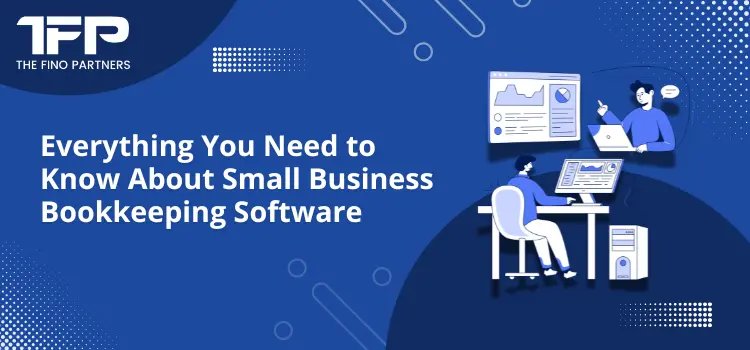Small businesses frequently experience financial management jinxes due to a lack of resources. From tiny companies to global corporations, bookkeeping is a crucial part of the "success-mantra." Despite this, bookkeeping is unnerving and time-consuming for small firms. Using bookkeeping software is the finest approach for us to take advantage of the modern tech-savvy world. Software for bookkeeping created specifically for small enterprises is a hidden gem. It assists with creating financial reports, monitoring expenses, managing payroll, and creating invoices in addition to streamlining financial administration. This blog answers some of the most searched queries in the web along with the considerations, factors and advantages small businesses, especially in the states, need to care about before choosing a software for bookkeeping for your business.
The Importance of Bookkeeping: How Small Businesses can enjoy an override
- Small businesses in particular need to exercise due care because bookkeeping includes all the various elements of financial management.
- Small businesses are responsible for overseeing all financial transactions, including sales, purchases, bills, and payments, all by themselves. By providing a ‘panorama-view’ of the financial situation, bookkeeping enables businesses to make better decisions, maintain compliance, and steer clear of financial disasters..
- Due to lack of resources, time and revenue, small businesses lack the discipline and skills to manage accuracy in books which can lead to missed tax deadlines, missing out on tracking cash flow and much more.
- By automating many manual procedures, lowering errors, and guaranteeing accurate and current financial records, bookkeeping software helps avoid these problems.
Key Features of Small Business Bookkeeping Software
When selecting a bookkeeping software, make sure the provided features are compatible with the demands of your small business. The following are some of the features-
- Invoicing and Billing
You should be able to efficiently create and send invoices using bookkeeping software. Seek software that lets you track overdue invoices, personalize invoices, and schedule automated reminders.
- Expense Tracking
With the software, you should be able to manage cash flow and get ready for tax season by categorizing expenditures, uploading receipts, and keeping an eye on your spending in real-time.
- Bank Reconciliation
Search for software that can easily be matched with your records and that automatically input bank transactions. It also lowers the potential of mistakes, saving time.
- Financial Reporting
Creating financial reports is essential to grasping the functioning of the business you run. A variety of reports, including cash flow statements, financial statements, and statements of earnings and expenses, should be available in bookkeeping software.
- Payroll Management
Payroll management is crucial if your business employs people. Search for payroll software that may generate pay stubs and withhold taxes.
- Tax Preparation and Filing
By monitoring taxable income, preparing tax reports, and interfacing with tax filing systems, bookkeeping software may make tax season easier.
- Cloud-Based Access
Financial records are accessible from any location with internet access thanks to cloud-based software, which also offers automated backups and upgrades.
- Multi-User Access
Multi-user access is crucial if there are several stakeholders in the business. Select software that lets you give each user varying levels of permission.
- Integration with Other Business Tools
Opt for accounting programs that can be integrated with other applications you use, such project management software, e-commerce platforms, and CRM systems.
- Customer Support
trustworthy client service is essential. Explore for software that offers live chat, email, and phone assistance, among other methods.
Benefits of Using Bookkeeping Software for Small Businesses
Investing in bookkeeping software offers numerous benefits:
- Time Savings
By automating recurrent procedures like expenditure monitoring and invoicing, business owners can concentrate on expanding their businesses.
- Improved Accuracy
By simplifying calculations and offering integrated checks for data accuracy, bookkeeping software lowers errors.
- Better Financial Management
Owners of small businesses can make sensible choices regarding their businesses if they have access to current financial data.
- Compliance with Tax Regulations
By keeping track of tax obligations and producing tax returns, bookkeeping software contributes to compliance.
- Scalability
Because bookkeeping software is expandable, you can add users and features as the business expands.
- Enhanced Security
To safeguard your financial information, bookkeeping software vendors include features like encryption and multi-factor authentication.
Pointers to be noted when Choosing Bookkeeping Software
Remember the following criteria when choosing bookkeeping software:
- Cost
Software for bookkeeping can be bought at various pricing points. When weighing your selections, take into account your spending limit and the attributes you require.
- Ease of Use
The potential software should be easily handable so that you can operate it without any prior accounting knowledge. Browse for applications with user-friendly interfaces.
- Industry-Specific Features
There is bookkeeping software designed for particular businesses. Think about if you might be better served by software tailored to a certain sector.
- Compatibility with Your Accounting Needs
The ‘perfect-match’ of a software for your business should fulfil all of your financial demands along with being suitable with your current working system.
- Consulting User Reviews and Recommendations
Interact with industry-experts when choosing an accounting software for your business. Read customer reviews and testimonials to get a better idea on the product you will be investing on.
Conclusion
Small businesses should critically examine the technology before pouring down money on one software. The most compatible software with your business setting will ensure accuracy, will be time-effective and offer crucial insights into your financial health. This article can be considered ‘the-handbook’ for choosing the perfect software for your small business. This will ensure you can break-a-leg in the business market in the long run.
Read Also Ultimate Checklist for U.S. Small Business Bookkeeping



























